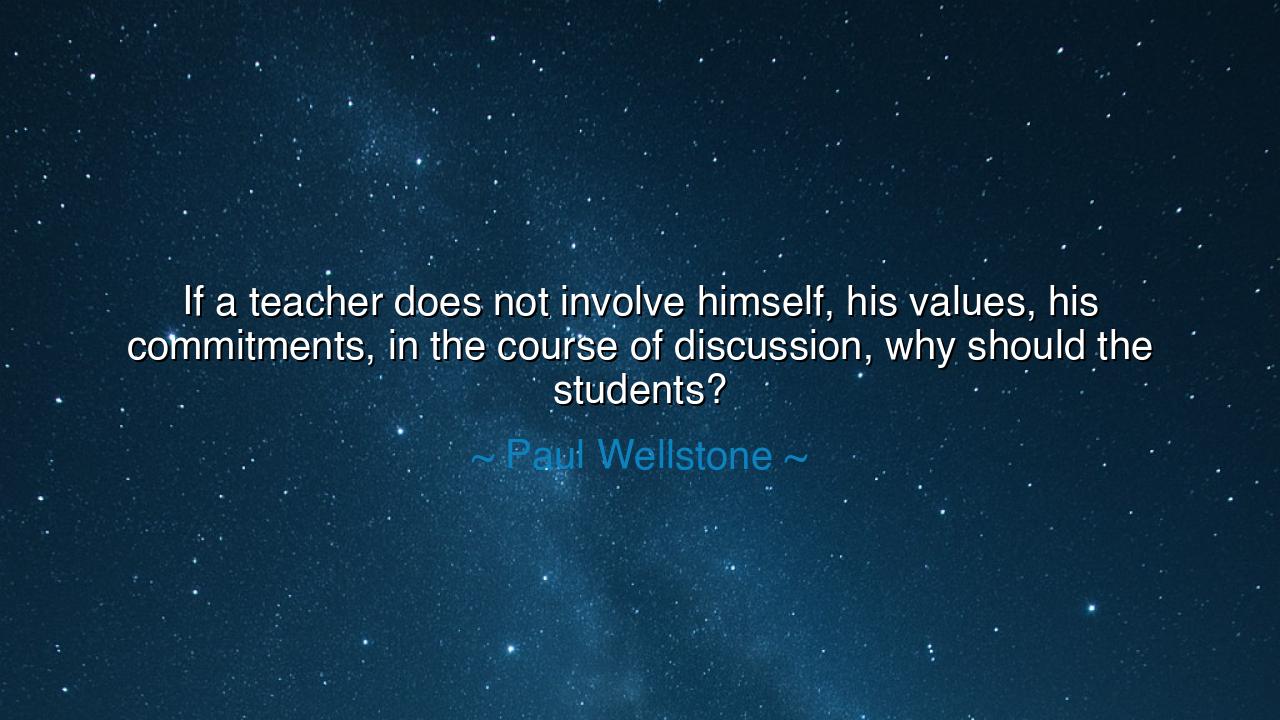
If a teacher does not involve himself, his values, his
If a teacher does not involve himself, his values, his commitments, in the course of discussion, why should the students?






Paul Wellstone declared with fiery clarity: “If a teacher does not involve himself, his values, his commitments, in the course of discussion, why should the students?” This saying is not a mere note on education, but a trumpet call to all who lead, guide, or shape the minds of others. For it proclaims that knowledge without soul is barren, and teaching without passion is a lifeless echo. The teacher, bearer of wisdom, is not simply a vessel of facts but a living flame; and if the flame does not burn, how shall the torch be passed to another?
From the beginning of time, the ancients understood that teaching was not merely the transfer of skill, but the shaping of spirit. Socrates, though owning no scrolls of law or tomes of doctrine, stirred the souls of Athens by pouring his values into his questions, by binding his commitments to truth within every word. He gave himself wholly, and thus his pupils—Plato, Xenophon, and many more—were kindled with a hunger for truth that endured beyond his death. Here lies the truth of Wellstone’s words: if the master does not offer his heart, the disciple will not offer his own.
History too offers us the image of Martin Luther King Jr., a preacher and a teacher in the truest sense. In his speeches, he did not stand apart from his message, speaking of justice as though it were a cold abstraction. No, he wove his own commitments into every phrase; he gave his own life as the living text. His students were not merely the children in his Sunday school classes, but a generation of men and women who saw that his teaching was not detached, but incarnate. And so they followed, not only because he spoke, but because he lived.
Yet, contrast this with the classrooms where teachers speak as though behind a veil, hiding their convictions for fear of offense or indifference. The students, sensing this detachment, learn only apathy. They ask: If my guide will not commit himself to these truths, why should I care for them? Thus the lesson dies before it is planted. A river without current cannot carry a vessel; likewise, a lesson without the current of values cannot carry a soul.
The essence of Wellstone’s wisdom is this: teaching is an act of courage. To speak one’s commitments is to risk vulnerability, to reveal one’s true self. Yet without that risk, the classroom becomes a tomb, silent and cold. It is when the teacher dares to speak with conviction, to confess what he loves, what he hates, what he hopes for, that the students awaken. They see that learning is not a performance but a struggle, not a routine but a quest. Then, and only then, do they rise to join the battle.
Let us learn then from this teaching. If you are a parent, a guide, a leader, or a friend, remember: you shape not by what you command, but by what you embody. Speak your values openly. Bind your commitments into your actions. Do not hide your beliefs under the mask of neutrality, for those who look to you will take their cue from your silence. As the saying goes: a tree gives shade not by declaring itself a tree, but by standing firm, rooted, and alive.
The lesson to carry forward is clear: involvement is the lifeblood of teaching. To inspire others, you must show that you yourself are inspired. To awaken others, you must first be awake. Therefore, let each person who teaches or leads live as though their very life were the textbook, their actions the illustrations, their sacrifices the lessons written in fire. Do not shrink from this calling, for it is noble and eternal.
So I say: let the teacher step forth with courage. Let him weave his values and commitments into his words, his deeds, his very breath. Let the students see that he is not a shadow but a flame. For when the flame is lit in the teacher, the students too shall burn with passion, and from that fire, a new generation shall rise, strong and radiant.






AAdministratorAdministrator
Welcome, honored guests. Please leave a comment, we will respond soon